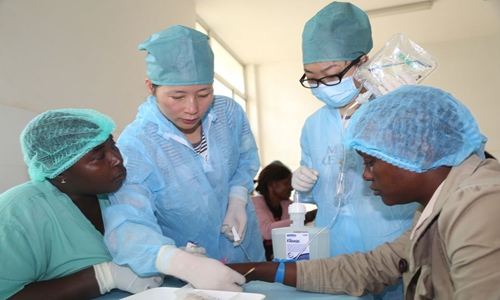HOME >> OPINION,SPECIAL-COVERAGE
COVID-19 tests China-Africa public health cooperation
By Shen Shiwei Source:Global Times Published: 2020/2/23 13:23:40

File photo shows local medical members receiving training from a medical team of People's Liberation Army (PLA), to fight against Ebola disease at a hospital in Freetown, capital of Sierra Leone, December 10, 2014. Photo: Xinhua
Africa should keep high alert on the risks of COVID-19 spreading into the continent. Early preparedness and training conducted by the Africa Center for Disease Control and Prevention (Africa CDC) and its regional centers have shown Africa's increasing capacity to counter epidemics. And a continental strategy under discussion in Africa Union would unite the strength to counter COVID-19.Since the outbreak of COVID-19, Africa CDC has invested in preparedness and response to the disease. In Dakar, Senegal, Africa CDC conducted training sessions and supplied test kits to 16 African laboratories. In Nairobi, Kenya, training was conducted for 40 participants from nine countries on enhancing detection and investigation of COVID-19 at points-of-entry. According to WHO, many African countries are now capable of testing for COVID-19.
How has Africa CDC been so quick to respond to the epidemic? Formalized in 2015 and officially launched in 2017, the urgently needed Africa CDC is a milestone for the continent and a showcase of China's continuous support of Africa in public health sector.
In the past 60 years, Chinese public health professionals and medical aid teams have been working across 53 African countries to offer help to strengthen their vulnerable public health systems.
The Ebola outbreak in 2014 accelerated the Africa Union's determination to strengthen its pan-Africa epidemic control capacity. Since then, China has embarked on a systemic public health development aid program in Africa. Chinese Center for Disease Control and Prevention (China CDC) has drafted cooperation plans, developed many public health training and disease-control programs in Africa, in collaboration with Africa CDC, WHO, US CDC and other partners.
Years of hard work have yielded good results. Today, Sierra Leon's well-equipped capacity for dealing with epidemics is built on the Sierra Leon-China Friendship Biological Laboratory (SLE-CHN Biosafety Lab), a Chinese-built Biosafety Level 3 laboratory up to WHO standards and the first-ever biosafety laboratory in Sierra Leon. At the 2015 Johannesburg Summit of Forum on China-Africa Cooperation (FOCAC), China committed to support the establishment of Africa CDC.
By far, unprecedented measures adopted by China, a country with 1.4 billion people, have actually protected many other countries and regions. But how do Chinese living in Africa prepare themselves?
With years of experience in Africa, I have been carefully following the situation there since the outbreak. I know that many Chinese embassies, commercial chambers, companies and individuals in Africa have strengthened hygiene and disease control. Information is shared in groups of WeChat, a WhatsApp like social media in China. Chinese consular services and chambers inform all newly arrived Chinese to register and have a self-imposed home quarantine for 14 days.
However, the COVID-19 outbreak is not only a test for China-Africa public health cooperation and Africa's newly equipped CDC system, but also a battle on unverified information, even fake news, in the age of digitalization. Therefore, transparency and timely sharing of information have become crucial.
We have noticed that daily updates on social media like Twitter by African politicians, health officials, medical experts, Chinese embassies and diplomats have become important sources for media and residents to get updated. African people offer their best wishes to Chinese and get informed on the latest situation in China. For example, businesses had resumed in Yiwu, East China's Zhejiang Province, also a home for many African businessmen, showing the situation in some places is getting better.
When rumors and unverified messages appear, Chinese ambassadors and public health experts from Africa and WHO address concerns by holding press conferences that are broadcast live. Lin Songtian, Chinese Ambassador to South Africa, and John Nkengasong, director of Africa CDC, are two of them.
The emergency response to COVID-19 by African public health officials, experts and Chinese diplomats could be a good case study on China-Africa public health cooperation. China is supporting Africa CDC's five priority areas of the strategic plan 2017-21, including surveillance and disease intelligence, emergency preparedness and response in all technical components, and human capacity building.
As public health big data and epidemiology research become key themes in international public health cooperation, China and Africa could focus on more areas to address challenges presented by the sudden outbreak of epidemics, and support Africa in strengthening its public health control, prevention and treatment systems.
The author is non-resident fellow, Institute of African Studies, Zhejiang Normal University, and a research fellow at Charhar Institute. opinion@globaltimes.com.cn
RELATED ARTICLES:
Posted in: VIEWPOINT,FEATURE